- Home
- Harry Harrison
The Daleth Effect Page 8
The Daleth Effect Read online
Page 8
“Very poetical.” Henning refused to be cheered up. “She’s more of a luna moth than a butterfly now. Take good care of her.”
“You can be sure of that,” Nils said, sincerely. “It’s my own skin that I’m worried about, and Den Flyvende Blaeksprutte is the only transportation around. All changes finished?”
“All done. You have an air-pressure altimeter now, as well as a radio altimeter. Extra oxygen tanks, air-scrubbing equipment, a bigger external aerial, everything they asked for and more. We even put lunch aboard for you, and the admiral donated a bottle of snaps. Ready to go.” He reached out and shook the pilot’s hand. “Good luck.”
“See you later tonight.”
There was much handshaking then, last-minute instructions, and a rousing cheer as they went aboard and closed the hatch. A Danish flag had been painted on the conning tower and it gleamed brightly in the early morning sun.
“Dogged tight,” Nils said, giving an extra twist to the wheel that sealed the hatch above, set into the conning tower’s deck.
“What about the hatch on top of the tower?” Ove asked.
“Closed but not sealed, as you said. The air will bleed out of the conning tower long before we get there.”
“Fine. That’s about as close to an airlock as we can rig on a short notice. Now, are we all certain that we know what to do and how to do it?”
“I know,” Nils grumbled, “but I miss the checklists.”
“The Wright brothers didn’t have checklists. We’ll save that for those who follow after. Arnie, can we run through the drill once more?”
“Yes, of course. We have a computation coming up in about twenty minutes, and I see no reason why we should not make it.” He went forward to look out of a port. “The ship is moving away to give us plenty of room.” He pointed down at the controls in front of Nils, most of them newly mounted on top of the panel.
“Nils, you are the pilot I have rigged controls here for you that will enable you to change course. We have gone over them so you know how they operate. We will have to work together on take-offs and landings, because those will have to be done from the Daleth unit, which I will man. Ove is our engine room and will see to it that we have a continuous supply of current. The batteries are still here, and charged, but they will be saved for emergencies. Which I sincerely hope we will not have. I will make the vertical take-off and get us clear of the atmosphere. Nils will put us on our course and keep us on it. I will control acceleration. If the university computer that ties in with the radar operates all right, they should tell us when to reverse thrust. If they do not tell us, we shall have to reverse by chronometer and do the best we can by ourselves.”
“Now that is the part I don’t understand,” Nils said, pushing his cap back on his head and pointing to the periscope. “This is a plain old underwater periscope—now modified so that it looks straight up rather than ahead. It had a cross hair in it. Fm supposed to get a star in the cross hair and keep it there, and you want me to believe that this is all we have to navigate by? Shouldn’t there be a navigator?”
“An astrogator, if you want to be precise.”
“An astrogator then. Someone who can plot a course for us?”
“Someone whom you can have a little more faith in than a periscope you mean?” Ove asked, laughing, and opened the door to the engine compartment.
“Exactly. I’m thinking about all those course corrections, computations, and such that the Americans and Soviets have done before to get to the Moon. Can we really do it with this?”
“We have the same computations behind us, realize that. But we have a much simpler means of applying them because of the shorter duration of our flight. When time is allowed for our initial slower speed through the atmosphere, our flying time is almost exactly four hours. Knowing this, certain prominent stars were picked as targets and the computations were made. Those are our computation times. If we leave at the correct moment and keep the target star in the sight all of the time, we will be aiming at the spot in the Moon’s orbit where it will be at the end of the four hours. We both move to our appointed meeting place, and the descent can be made. After we locate the Soviet capsule, that is.”
“And that is going to be easy?” Nils asked, looking dubious.
“I don’t see why not,” Ove answered, poking his head out of the engine cubby, wiping his hands on a rag. “The generator is operating and the output is right on the button.” He pointed to the large photograph of the Moon pasted to the front bulkhead. “Goodness, we know what the Moon looks like, we’ve all looked through telescopes and can find the Sea of Tranquility. We go there, to the right spot, and if we don’t see the Soviets we use the direction finder to track them down.”
“And at what spot do we look in the Sea of Tranquility? Do we follow this?” Nils pointed to the blurry photograph of the Moon that had been cut from the newspaper Pravda.› There was a red star printed in the north of the mare where the cosmonauts had landed. “Pravda says this is where they are. Do we navigate from a newspaper photo?”
“We do unless you can think of something better,” Arnie said mildly. “And do not forget our direction finder is a standard small boat model bought from A.P. Moller Ship Supplies in Copenhagen. Does that bother you too?”
After one last scowl Nils burst out laughing. “The whole thing is so outrageous that it just has to succeed.” He fastened his lap belt. “Blaeksprutten to the rescue!”
“It is all much more secure than it might look,” Ove explained. “You must remember that we had this operational submarine to begin with. It is a sealed, tested, proven, self-sufficient spaceship built for a different kind of space. But it works just as well in a vacuum as under water. And the Daleth drive is operational and reliable—and will get us to the Moon in a few hours. The combination of radar and computer on Earth will track us and compute the correct course for us to follow. Everything possible has been done to make this trip a safe one. There will be later voyages and the instrumentation will be refined, but we have all we need now to get us safely to the Moon afld back. So don’t worry.”
“Who is worrying?” Nils said. “I always sweat and get pale at this time of day. Is it time to leave yet?”
“A few more minutes to go,” Arnie said, looking at the electronic chronometer before him. “I am going to take off and get a bit of altitude.”
His fingers moved across the controls and the deck pressed up against them. The waves dropped away. Tiny figures were visible aboard the Vitus Bering, waving enthusiastically, then they shrank and vanished from sight as Blaeksprutten hurled itself, faster and faster, into the sky.
The strangest thing about the voyage was its utter uneventfulness. Once clear of the atmosphere they accelerated at a constant one G. And one gravity of acceleration cannot be sensed as being different in any way from the gravity experienced on the surface of the Earth. Behind them, like a toy, or the projection on a large-size screen, the globe of the Earth shrank away. There was no thunder of rockets or roar of engines, no bouncing or air pockets. Since the ship was completely sealed, there was not even the small drop in atmospheric pressure that is felt in a commercial airliner. The equipment worked perfectly and, once clear of the Earth’s atmospheric envelope, their speed increased.
“On course—or at least we are aimed at the target star,” Nils said. “I think we can check with Copenhagen now and see if they are tracking us. It would be nice to know if we are going in the right direction.” He switched the transceiver to the preset frequency and called in the agreed code.
“Kylling calling Halvabe. Can you read me? Over.” He threw the switch. “I wonder what drunk thought up these code names,” he mumbled to himself. The sub was the “chick” and the other station the “lemur”—but these names were also slang terms for a quarter-litre and a hali-litre bottle of akvavit.
“We read you loud and clear, Kylling. You are on course, though your acceleration is slightly more than optimum. Suggest a five percent re
duction.”
“Roger. Will conform. Are you tracking us?”
“Positive.”
“Will you send turnover signal?”
“Positive.”
“Over and out.” He killed the power. “Did you hear that? Things couldn’t be better.”
“I have cut the acceleration by the five percent,” Arnie said. “Yes, things could not be better.”
“Would anyone like a Carlsberg?” Ove asked. “Someone has stuffed a whole case back here.” He passed a can to Nils, but Arnie declined.
“Finish them quickly,” he said. “We are not far from turnover, and I cannot guarantee that things will not get shaken up a bit. I could reduce the thrust to zero before I turned the ship, but that would put us in free fall for awhile and I would like to avoid that if I could. Aside from our personal feelings, the equipment just isn’t designed for it. Instead, I shall attempt to rotate the ship one hundred eighty degrees while maintaining full thrust, at which point we will begin to decelerate.”
“Sounds fine to me,” Nils said, squinting through the periscope and making a precise adjustment. “But what about our course? Is that what we use this gas pipe in the deck for? The one that Henning was moaning about because it needed a hole in his pressure hull?”
“That is correct. There is a wide-angle lens system here, with an optical gunsight fitted into it.”
“The kind used on fighter planes to fire the guns?”
“Precisely. You will keep the star centered as before. I envisage no problems.”
“No, no problems at all.” Nils looked around at the jury-rigged and hurriedly converted sub and shook his head in wonder. “Will one of you take the con for me for a minute? I have to go to the head… The beer, you know.”
Turnover went smoothly, and they would not have known they were rotating if they hadn’t watched the sunlight move across the deck and up the bulkhead. A few loose objects rattled, and a pencil rolled across the desk and fell.
Time moved swiftly. The sun glared and there was some discussion of solar storms and Van Allen radiation. These were no serious menace since the pressure hull of the submarine was a solid metal barrier, incredibly thicker than that of any rocket ever launched.
“Have you thought about talking to the cosmonauts?” Ove asked. He stood in the doorway of the engine compartment where he could watch the fusion generator and talk with the others at the same time.
“They are all pilots,” Nils said. “So they should speak English.” Ove disagreed.
“Only if they have flown out of the country. Inside the Soviet Union Aeroflot uses Russian. Only on international flights is English required for radio control. I put in six months there, at Moscow University, so I can talk to them if I have to. I was hoping that one of you was more fluent.”
“Hebrew, English, Yiddish, or German,” Amie said. “That’s all.”
“Just English, Swedish, and French,” Nils told them. “It looks like it is up to you, Ove.”
Like most Europeans with college education they took it for granted that one spoke at least one language other than his own. Like Scandinavians, two or three other languages were more likely. They assumed that the cosmonauts would speak something they could understand.
The computer kept track of their progress and, when the four hours were neaiing their end, they were informed that they could turn on their radio altimeter because they were nearing the point where it would be effective. Its maximum range was a hundred and fifty kilometers.
“Getting a fringe reading,” Nils called, excited. “The Moon is down there all right.” Since midpoint they had not seen the satellite which was beneath their keel.
“Let me know when we are about a hundred kilometers above the surface,” Arnie said. “I’ll roll the ship then so we can see through the side ports.”
There was a growing tension now as the spacegoing submarine hurtled down toward the Moon, still out of sight below them.
“The altimeter is unwinding pretty fast,” Nils said, his controlled pilot’s voice showing none of the tension he felt.
“I’ll raise the deceleration up to two G’s,” Arnie said. “Stand by.”
It was a strange sensation, as though they were suddenly growing heavier, with their arms pulled down and their chins sinking to their chests: their chairs creaked and their breathing labored. Nils moved his hand to the controls, and it felt as though weights hung from his arm. He weighed over four hundred pounds now. “Rate of drop slowing,” he said. “Coming up on a hundred kilometers. Rate of drop slowing to near zero.”
“I’m going to hover at this altitude while we look for the target area,” Arnie said. Thankfully. He was too obviously aware of the thudding of his heart as it labored to pump blood in the doubled gravity. As he adjusted the controls weight fell away, to one gravity, and past that, until it felt as though they would float free. Hovering now, they were in the grip of the Moon’s gravitic field, a mere one-sixth of that of the Earth. “Rotating,” he said.
Loose objects rolled across the deck and clattered against the wall as they tilted over; they clung to the arms of their chairs. White light flooded in through the port.
uIh; du Almaegtige!” Nils whispered. There it was. Filling the sky. Less than seventy miles below them. Cratered, streaked, pitted, dead and airless, another world. The Moon.
“Then we’ve done it,” Ove said. “Done it!” he shouted with rising excitement. “By God we’ve crossed space in this tub and we’ve reached the Moon.” He unhooked his belt and stood, staggering as he tried to walk in the lessened gravity. Sliding, half falling, he slammed into the bulkhead, unheeding, as he braced himself to look out of the port.
“Just look at that, will you! Copernicus, the Sea of Storms, now where would the Sea of Tranquility be? To the east, in that direction.” He shaded his eyes against the reflected glare. “We can’t see it yet, but it has to be that way. Over the curve of the horizon.”
Silent as a falling leaf Blaeksprutten tilted back to the horizontal, then rotated about an invisible axis. They had to lean back to balance themselves as the bow swung down and the Moon reappeared, this time directly ahead.
“Is that enough of an angle for you to see to navigate by?” Arnie asked.
“Fine. There’s worse visibility from an airliner.”
“Then I shall hold this attitude and this height and switch forward and lateral control to your position.”
“On the way.” Nils hummed happily to himself as he pressed gently on his control wheel.
* * *
The three cosmonauts stood to attention as best they could in the cramped module with limited floor space: Zlotnikova had his nose pressed practically against the colonel’s hairy shoulder. The last notes of “The Internationale” died away and the radio speaker hissed gently with static.
“At ease,” Nartov ordered, and the other two dropped into their bunks while he picked up the microphone and switched it on. “In the name of my fellow cosmonauts, I thank you. They stand behind me, and agree with me, when in this moment of victory, I say that you, fellow citizens of the Union of Soviet Socialist Republics, should not grieve. This is a victory for us all; for the Party Chairman, Members of the Presidium, workers in the factories where parts of the rocket and capsule were manufactured, to be assembled by…”
Lieutenant Zlotnikova’s attention wandered: he had never been one for either making speeches or listening to them. Stolidly, he had listened to thousands upon thousands of hours of speeches during his twenty-eight years on Earth. And on the Moon. They were an accepted evil, like snow in the winter and drought in the summer. They were there, whether one liked it or not, and nothing could be done about them. Best to ignore them and suffer them, which was where a fatalistic, Slavic state of mind helped. He was a fighter pilot, one of the best, and a cosmonaut, one of the few. Attaining these goals was worth any sacrifice. Listening to speeches was only a minor bother. Even death was not too high a price to pay. He had no regrets; t
he game was worth the candle. But he just wished it could be done with a few less speeches. The colonel’s voice droned on and he glanced out of the viewport, then turned quickly away since at least an appearance of courtesy was called for. But the colonel had his back turned, with his right fist clenched in a salute and marking time to the strong rhythm of his words. It must be a good speech. At least the colonel was enjoying it. Zlotnikova turned back to the port—then tensed abruptly at the slowly moving speck of light high above. A meteor? Moving so slowly?
“…and how many died in battle to preserve the freedom of our great land? The Red Army never hesitated to embrace death for the greater good, peace, freedom, liberty, and victory. Should Soviet cosmonauts shirk responsibilities, or ignore the realities of—angrily he brushed away the bothersome hand that was tapping him on the shoulder. “…the realities of space flight, of the complexity…”
“Colonel!”
“—the complexity of the program, the great machines, the responsibilities…” Bothering him in the middle of this speech—was the bastard mad? “…to all the Soviet workers who made possible…”
Colonel Nartov wheeled about to glare and silence the lieutenant. But. his gaze followed Zlotnikova’s pointing finger to the port, through the thick glass, across the cratered, airless moonscape to the small submarine which was slowly settling down out of the star-flecked sky.
The colonel coughed, gasped, cleared his throat, and looked at the microphone in his hand with something resembling horror. “I will complete this call later,” he said abruptly, and switched off. “What the hell is that?” he roared.
For obvious reasons, neither of the other men answered. They were shocked, silent, and the only sound was the whispering of their last bit of depleted atmosphere coming through the grill, the mutter from the radio of distant music as someone back on Earth started the band playing again to cover the untimely silence from the Moon.

 Arm of the Law
Arm of the Law The Velvet Glove
The Velvet Glove The K-Factor
The K-Factor Sense of Obligation
Sense of Obligation Deathworld: The Complete Saga
Deathworld: The Complete Saga Montezuma's Revenge
Montezuma's Revenge The Ethical Engineer
The Ethical Engineer The Stainless Steel Rat Returns
The Stainless Steel Rat Returns The Misplaced Battleship
The Misplaced Battleship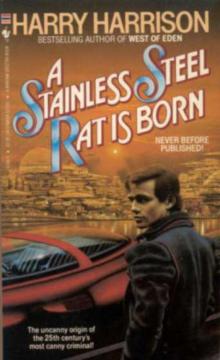 The Stainless Steel Rat is Born
The Stainless Steel Rat is Born Planet of the Damned bb-1
Planet of the Damned bb-1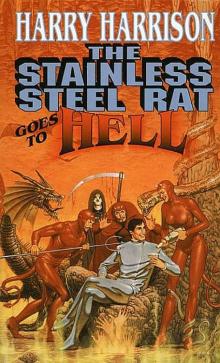 The Stainless Steel Rat Goes to Hell ssr-10
The Stainless Steel Rat Goes to Hell ssr-10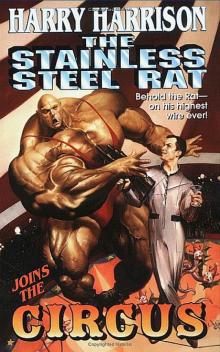 The Stainless Steel Rat Joins the Circus ssr-11
The Stainless Steel Rat Joins the Circus ssr-11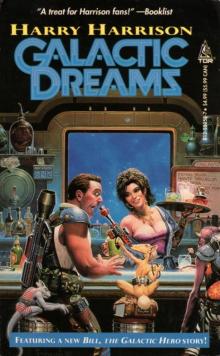 Galactic Dreams
Galactic Dreams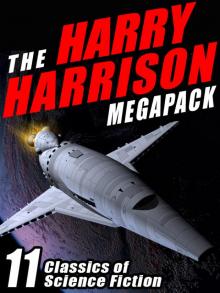 The Harry Harrison Megapack
The Harry Harrison Megapack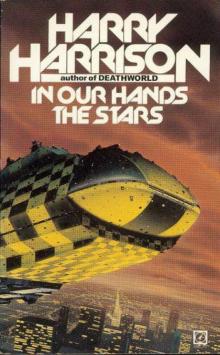 In Our Hands the Stars
In Our Hands the Stars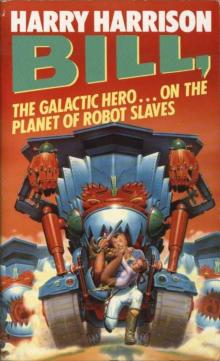 On the Planet of Robot Slaves
On the Planet of Robot Slaves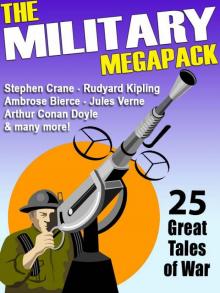 The Military Megapack
The Military Megapack Make Room! Make Room!
Make Room! Make Room! Wheelworld
Wheelworld Winter in Eden e-2
Winter in Eden e-2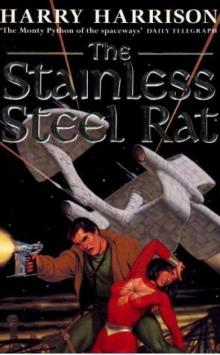 The Stainless Steel Rat
The Stainless Steel Rat The Stainless Steel Rat Goes to Hell
The Stainless Steel Rat Goes to Hell Harry Harrison Short Stoies
Harry Harrison Short Stoies Stainless Steel Rat 11: The Stainless Steel Rat Returns
Stainless Steel Rat 11: The Stainless Steel Rat Returns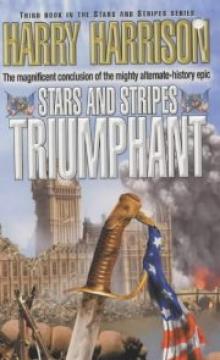 Stars and Stripes Triumphant sas-3
Stars and Stripes Triumphant sas-3 West of Eden
West of Eden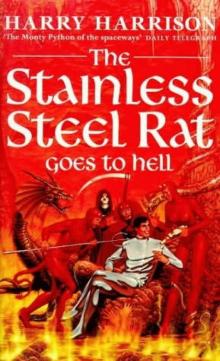 The Stainless Steel Rat Go's To Hell
The Stainless Steel Rat Go's To Hell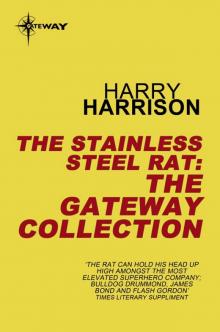 The Stainless Steel Rat eBook Collection
The Stainless Steel Rat eBook Collection Lifeboat
Lifeboat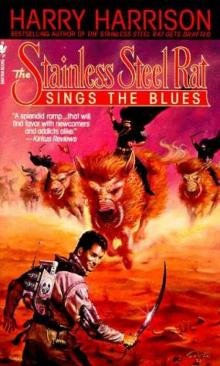 The Stainless Steel Rat Sings the Blues
The Stainless Steel Rat Sings the Blues Deathworld tds-1
Deathworld tds-1 On the Planet of Zombie Vampires
On the Planet of Zombie Vampires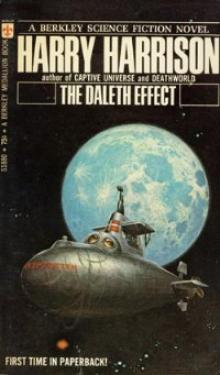 The Daleth Effect
The Daleth Effect On The Planet Of The Hippies From Hell
On The Planet Of The Hippies From Hell The Turing Option
The Turing Option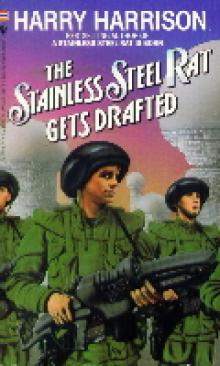 The Stainless Steel Rat Gets Drafted
The Stainless Steel Rat Gets Drafted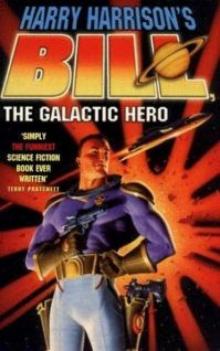 Bill, the Galactic Hero btgh-1
Bill, the Galactic Hero btgh-1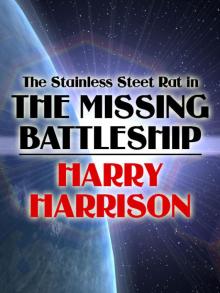 The Stainless Steel Rat in The Missing Battleship
The Stainless Steel Rat in The Missing Battleship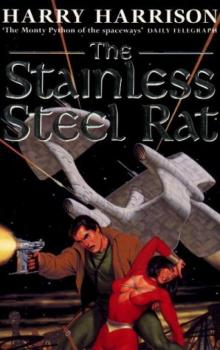 The Stainless Steel Rat ssr-1
The Stainless Steel Rat ssr-1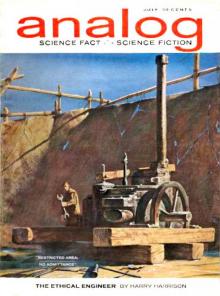 The Ethical Engineer (the deathworld series)
The Ethical Engineer (the deathworld series)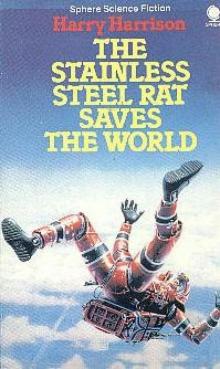 The Stainless Steel Rat Saves the World ssr-3
The Stainless Steel Rat Saves the World ssr-3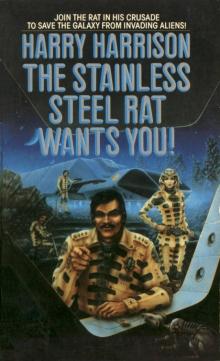 The Stainless Steel Rat Wants You
The Stainless Steel Rat Wants You One King's Way thatc-2
One King's Way thatc-2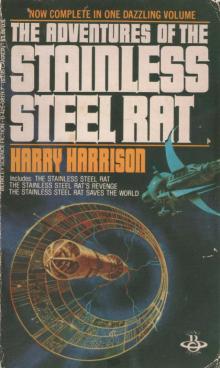 The Stainless Steel Rat Saves The World
The Stainless Steel Rat Saves The World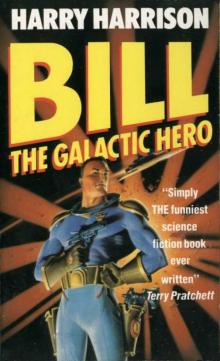 Bill, the Galactic Hero
Bill, the Galactic Hero Stars & Stripes Forever
Stars & Stripes Forever Stars and Stripes In Peril sas-2
Stars and Stripes In Peril sas-2 A Stainless Steel Rat Is Born ssr-6
A Stainless Steel Rat Is Born ssr-6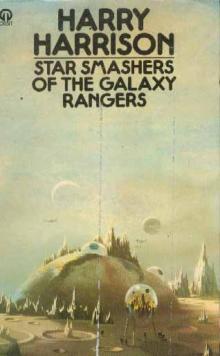 Star Smashers of the Galaxy Rangers
Star Smashers of the Galaxy Rangers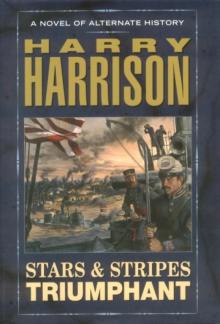 Stars & Stripes Triumphant
Stars & Stripes Triumphant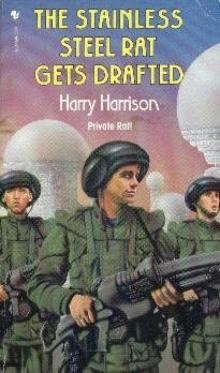 The Stainless Steel Rat Gets Drafted ssr-7
The Stainless Steel Rat Gets Drafted ssr-7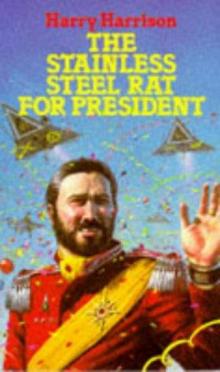 The Stainless Steel Rat for President ssr-5
The Stainless Steel Rat for President ssr-5 The Hammer & the Cross
The Hammer & the Cross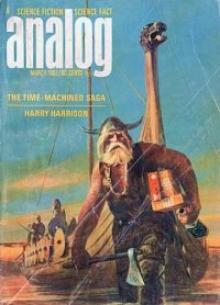 The Technicolor Time Machine
The Technicolor Time Machine The Hammer and The Cross thatc-1
The Hammer and The Cross thatc-1 King and Emperor thatc-3
King and Emperor thatc-3 Return to Eden
Return to Eden The Stainless Steel Rat’s Revenge ssr-2
The Stainless Steel Rat’s Revenge ssr-2 West of Eden e-1
West of Eden e-1 Return to Eden e-3
Return to Eden e-3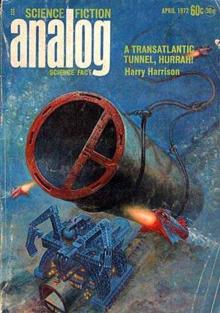 A Transatlantic Tunnel, Hurrah!
A Transatlantic Tunnel, Hurrah! Stars and Stripes Forever sas-1
Stars and Stripes Forever sas-1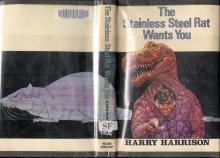 The Stainless Steel Rat Wants You ssr-4
The Stainless Steel Rat Wants You ssr-4 The Horse Barbarians tds-3
The Horse Barbarians tds-3 Planet of the Damned and Other Stories: A Science Fiction Anthology (Five Books in One Volume!)
Planet of the Damned and Other Stories: A Science Fiction Anthology (Five Books in One Volume!)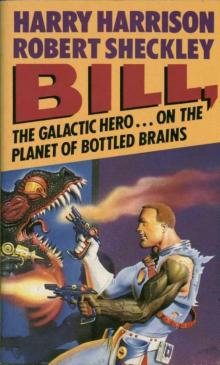 On the Planet of Bottled Brains
On the Planet of Bottled Brains Stars And Stripes In Peril
Stars And Stripes In Peril The Stainless Steel Rat's Revenge
The Stainless Steel Rat's Revenge Captive Universe
Captive Universe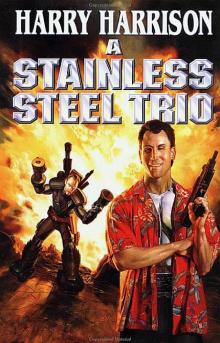 The Stainless Steell Rat Sings the Blues ssr-8
The Stainless Steell Rat Sings the Blues ssr-8 Harry Harrison! Harry Harrison!
Harry Harrison! Harry Harrison! Winter in Eden
Winter in Eden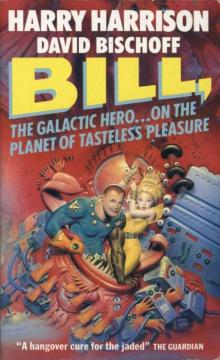 On the Planet of Tasteless Pleasures
On the Planet of Tasteless Pleasures